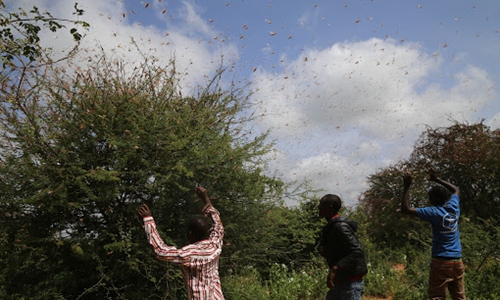HOME >> ARTS
Documentary about raising chickens to fight locusts goes viral on Chinese social media
By Ji Yuqiao Source:Global Times Published: 2020/2/17 22:17:10

Farmers attempt to scare away locusts from their farms in Mwingi North, Kenya, Jan. 29, 2020. The Food and Agriculture Organization of the United Nations said late in January that it requires 7 billion shillings (about 70 million U.S. dollars) to tackle the locust plague that has already infested the Horn of Africa. (Xinhua/Fred Mutune)
Amid huge swarms of locusts in East Africa and warnings from the United Nations, a Chinese documentary about a biological control method for locust plagues - using chickens - has gone viral on Chinese social media.
The Food and Agriculture Organization of the United Nations warned the world on February 11 of a plague of locusts leaving Africa and flying over the Red Sea into Europe and Asia, potentially reaching Pakistan and India.
The locust swarms captured the attention of lots of Chinese netizens, who expressed their support and concern for people in affected areas.
The documentary, which was produced by China Central Television (CCTV) and was released years ago, tells a story about farmers from North China's Hebei Province raising and grazing chickens on the grassland to let them eat locusts.
Chinese netizens said the method in the documentary shows raising chickens can fight locust plagues. The related hashtag has been one of the hot search topics on China's Twitter-like Sina Weibo amid the huge locust swarms in East Africa.
"After watching the documentary, I could see that chickens can become experts on eliminating locusts. They perform better than human beings, actually," one of the Sina Weibo users commented.
Many netizens said such a biological control method is much better than dusting crops with insecticide when fighting locusts. "Raising chickens is cheaper and after winning the combat over locusts, these chickens can continue to lay eggs and be sold. What a perfect method!" another netizen wrote.
Chinese netizens also wanted to recommend the method to areas affected by the locust plague.
The Chinese government offered baby chicks for free to residents in different places including Hebei Province, Northwest China's Xinjiang Uygur Autonomous Region and Gansu Province, and guided them how to train these chicks, the documentary said.
After growing for 40 days, the chickens are taken to the grasslands and undergo more training for another 90 days until they can be organized.
These chickens are able to understand farmers' whistles and can follow humans no matter how far they run after being trained. Farmers only need to blow whistles to summon chickens, which can even run after tractors, and can take them to other places.
When they arrive at the grasslands where locusts gather, the chickens instantly start eating the insects. They "work" in the morning and have a rest at noon. Farmers decide when and where the chickens work according to the weather conditions.
"The method can relieve locust problems. Poultry such as chickens and ducks are natural enemies of locusts and can effectively suppress the insect," Yan Xizhong, a teacher at Shanxi Agricultural University, told the Global Times on Monday.
Yan also said that chickens eating locusts are more suitable for small-scale locust plagues. "When there are too many locusts, I think using airplanes to spread insecticide is more effective."
Besides chickens, ducks also contribute to the fight against locusts in China.
According to a report by Qianjiang Evening News, almost 100,000 ducks joined the locust plague battle in Xinjiang in May 2000 and were effective.
By the end of August of that year, the ducks had cleared locusts from at least one million acres of grassland in Xinjiang. The duck became the hero of Xinjiang's "anti-locust disaster relief," the report said.
"One duck can eat more than 100 locusts without rest; they are like troops," a farmer said.
Posted in: TV